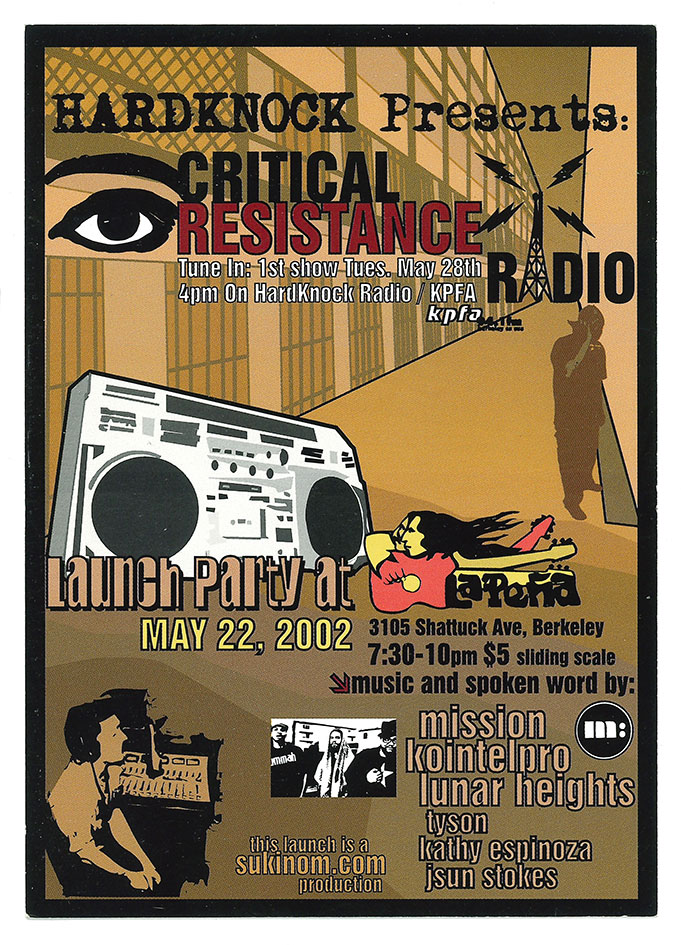Critical Resistance Spreading Abolition on the Air!
From 2002-2007, Critical Resistance’s Oakland chapter joined forced with KPFA’s HardKnock Radio (KPFA 94.1, KPFB 89.3 in Berkeley and KFCF 88.1 in Fresno to bring up-to-date news, personal stories, and cultural highlights about the prison industrial complex and the fight for abolition to the free speech airwaves of California, reaching inside a majority of California’s prisons while bringing voices of prisoners and prisoners’ families outside the prison walls.
CR Radio as an Organizing Tool
Critical Resistance started CR Radio because we were thinking a lot about: how do we create an outreach scenario to reach people inside that doesn’t require permission? Because they can fuck with the mail and visits. But they can’t stop the show from going in. At least not easily. We thought of it as a “Radio Free Critical Resistance,” or “Radio Free California.”
We first talked about it at a meeting, and came up with a proposal to talk with KPFA (a Pacifica station). Increasingly, we started thinking more about how to involve former prisoners, and now the show is all hosted by former prisoners, though we need to get more folks involved in the writing of the show.
The show has started listening groups inside, and people do come through the chapter through the show.
Usually we had between 4 and 6 people reading and doing interviews on the show, all of whom are former prisoners. CR members also seek input from prisoners, via call-ins and written submissions of materials, poetry, show ideas, and stories.
Each show had a topic that the main story and interview segment explore. The show consisted of four parts:
- 6 Newsflashes – short news stories about the PIC
- Main Story, with inserted soundbites from at least three people about a topic
- 15 minute interview segment, with the show’s host
- Prisoner mailroom segment
Organizing Opportunities
The show had a broad reach – Pacifica stations are not only widely listened to in California, but the show reached 70% of the prisons in California, some with active prisoner listening and study groups. Prisoners occasionally told their family members to get in contact with us after hearing the show. And former prisoners heard the show and called us to find out how they can get involved.
Everyone heard on the show was a former prisoner, which gave the chapter a regular way to organize with former prisoners and a way for former prisoners’ voices, analysis and issues a rare chance to be heard.
We tried as much as possible to get prisoners’ voices on air, through reading their letters and submissions and interviewing, when possible, prisoners for the month’s show topic. Since prisoners have a hard time calling in at particular times, we set up a way to record interviews over the phone, to better be able to incorporate prisoners’ voices on the show. We also started having our host include a closing that encourages people to get involved.
The show definitely had some limitations as an organizing tool – it only aired once a month, and was only half an hour. Though we recognize the importance of information and political education as an organizing tool, we’re still struggling for better ways to also use the show as an on-the-ground organizing tool. Overall, we found the show to be really rewarding for everyone involved – from those who write for the show to those who get to hear their voices and opinions on the air to those who listen in. We did need to find better ways of producing it and using it, but it was a powerful tool to not only get information out to a wide range of people but also to bring people in to the work of the chapter and larger organization, to incorporate prisoners and former prisoners into the movement work and have them lead the work as much as possible. CR Radio allowed a greater number of people to hear Critical Resistance’s name and know our work.
A Few Shows:
- Episode: May 2002, Visitation Regulations
More Past Show Topics:
- June 2005: On Assata, Cointelpro and repression
- May2005: Criminalization of sex work
- March 2005: Creating alternatives to policing
- February 2005: Prison labor and connections to slavery
- January 2005: Abu Ghraib and the globalization of the PIC
- Dec 2004: What do the holidays mean for prisoners and their families? November 2004: The abuse of trans people in prison
- October 2004: Roots of Disenfranchisement in Slavery
- Sept 2004: California Performance Review Failure
- Aug 2004: A Labor Union or a Gang? The California Correctional Peace Officers Association
- July 2004: Race as Social Control inside
- June 2004: America’s Abu Ghraibs: Torture in US Prisons.
- May 2004: Interview with Angela Davis
- April 2004: California’s Failed Parole System
- March 2004: Prison Closures and the state budget
- Feb 2004: Prison Abolition
- Jan 2004: Death penalty in California, focusing on KEVIN COOPER
- December: 2003 Drastic proposed changes to VISITATION regulations
- November: 2003 Education inside
